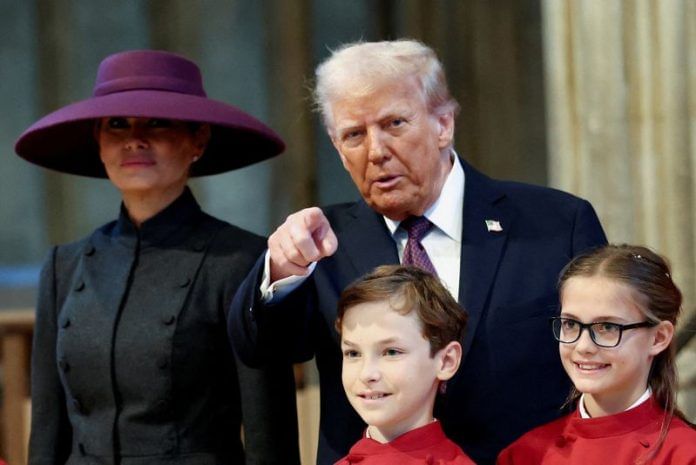By Michelle Nichols
UNITED NATIONS (Reuters) – World leaders gather in New York next week for a U.N. General Assembly dominated by U.S. President Donald Trump’s return to the rostrum, war in Gaza and Ukraine, rising Western recognition of Palestinian statehood and nuclear tensions with Iran.
“We are gathering in turbulent – even uncharted – waters,” U.N. Secretary-General Antonio Guterres said a week before the 193-member world body hosts six days of speeches by nearly 150 heads of state or government along with dozens more ministers.
“Geopolitical divides widening. Conflicts raging. Impunity escalating. Our planet overheating,” he told reporters on Tuesday. “And international cooperation is straining under pressures unseen in our lifetimes.”
Headlining this year’s 80th General Assembly will be Trump, who calls for slashing U.S. funding for the U.N., stopped U.S. engagement with the U.N. Human Rights Council, extended a halt to funding for the Palestinian relief agency UNRWA and quit the U.N. cultural agency UNESCO. He has also announced plans to quit the Paris climate deal and the World Health Organization.
Trump will speak on Tuesday, eight months into a second term marked by severe U.S. foreign aid cuts that have sparked global humanitarian chaos and raised questions about the U.N.’s future, prompting Guterres to try to cut costs and improve efficiency.
“He enjoys the General Assembly. He enjoys the attention of other leaders,” International Crisis Group U.N. director Richard Gowan said of Trump. “My suspicion is he is going to be using his appearance to boast about his many achievements and perhaps once again, make the case he deserves the Nobel Peace Prize.”
Trump describes the U.N. as having “great potential” but says it has to get its “act together.” He has maintained the same wary stance on multilateralism that was a hallmark of his first term from 2017 to 2021 and also accused the world body of failing to help him try to broker peace in various conflicts.
“The U.N. has very strong efforts in peace mediation … but we have no carrots and no sticks,” Guterres said. The U.N. Security Council is the only U.N. body that can impose sanctions, but it has been deadlocked on the conflicts in Gaza and Ukraine because the U.S. and Russia are veto powers.
“The United States has carrots and sticks. So in some situations, if you are able to combine the two, I think we can have a very effective way to make sure that some peace process at least can lead to a successful result,” Guterres said.
He and Trump are expected to meet formally for the first time next week since Trump returned to office in January – one of more than 150 bilateral meetings the U.N. chief said he has scheduled, dubbing the week “the World Cup of diplomacy.”
WAR AND FAMINE
Leaders are gathering as the war between Israel and Hamas militants in the Gaza Strip approaches two years and a humanitarian crisis worsens in the Palestinian enclave, where a global hunger monitor has warned that famine has taken hold and is likely to spread by the end of the month.
Israeli Prime Minister Benjamin Netanyahu – wanted by the International Criminal Court over alleged war crimes and crimes against humanity in Gaza that Israel denies – is due to address the General Assembly on Friday. Israel unleashed a long-threatened ground assault on Gaza City on Tuesday.
Israel’s U.N. Ambassador Danny Danon said of the upcoming New York gathering: “We will remind the world once again that this war will not end with the hostages left behind in Gaza.”
Before the General Assembly speeches begin on Tuesday, leaders will gather on Monday for a summit – hosted by France and Saudi Arabia – that aims to build momentum toward a two-state solution between Israel and the Palestinians.
Australia, Belgium, Britain, Canada and France have pledged to formally recognize a Palestinian state, although some have set conditions.
Palestinian President Mahmoud Abbas will not be there in person. The U.S., a staunch Israeli ally, has said it will not give him a visa, drawing wide criticism at the U.N. He is expected to appear via video for both Monday’s summit and his General Assembly speech, scheduled for Thursday next week.
“Palestine is going to be the huge elephant in this session of the General Assembly,” said Palestinian U.N. envoy Riyad Mansour.
Another conflict topping the U.N. agenda, but on which little progress is expected to be made, is Russia’s more than three-year-old war in Ukraine.
Ukrainian President Volodymyr Zelenskiy and Russian Foreign Minister Sergei Lavrov will address the General Assembly. Russian President Vladimir Putin does not traditionally attend the annual U.N. gathering.
The 15-member U.N. Security Council, charged with maintaining international peace and security, is likely to hold meetings on Ukraine and Gaza during the high-level General Assembly session, diplomats said.
There will also be last-minute diplomacy in New York over Iran’s nuclear program as Tehran seeks to avoid a return of all U.N. Security Council sanctions on the Islamic Republic on September 28. Iranian President Masoud Pezeshkian and Foreign Minister Abbas Araqchi are both expected to be at the United Nations.
(Reporting by Michelle Nichols; Editing by Don Durfee and Howard Goller)
Disclaimer: This report is auto generated from the Reuters news service. ThePrint holds no responsibility for its content.




